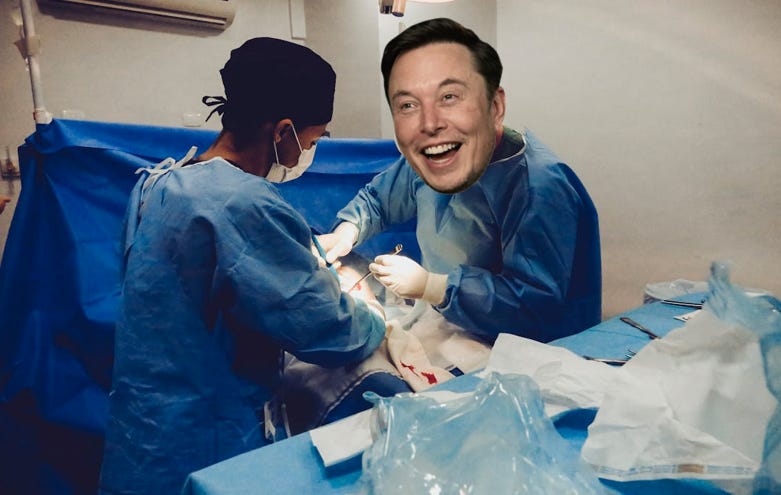No, Elon Musk didn't put a chip in anyone's brain, and we should not be terrified
The Guardian has published an article about the first person to have a chip put in his brain by Elon Musk, and asks, should we be terrified? Except, he didn't. And we shouldn't.
Look, I know I spend a lot of time picking apart things published in The Guardian. But that’s only because care about them, deep down. It’s tough love, but love nonetheless.
After all, I used to be their most popular science writer. I owe my career to the Guardian, in a very real and tangible way. And even when I was employed by them, much of my output was basically ragging on questionable things published elsewhere in the Guardian. So, old habits, etc.
Anyway, point is, today they published a (longread) piece titled Elon Musk put a chip in this paralysed man’s brain. Now he can move things with his mind. Should we be amazed - or terrified?
It’s 90% an in-depth profile of Nolan, the first individual to have a ‘Neuralink’ brain-chip computer interface implanted in his head, which allowed him to control devices just by ‘thinking’ about it.
Despite having suffered a terrible accident at a 22 years of age that left him paralysed, Nolan seems like a likeable and genial chap who tries to make the best of his lot. He’s also completely dependent on those around him who are willing to dedicate their lives to supporting him, and he voluntarily voted for Trump in the recent election. Make of that what you will.
He contains multitudes, I guess.
But to get to the point; the author of the piece makes a big deal of the potential for this technology to give Musk even more power than he already has. After all, he’s achieved this miracle, and if Musk’s predictions of tens of millions of people having their own chips implanted, which gives them their own ‘superpowers’, comes to pass, he’ll have direct control over countless people’s actual brains, won’t he?
I’ve said this before (twice on Radio 4), but… no, none of that’s not going to happen.
The disparity between Musk’s claims/goals regarding brain-chip interfaces, and these bleakly-common fears about what they’d let him do, warrant their own dedicated article. And it’s something I am working on.
But for now, here are my main bugbears regarding this article specifically.
Elon Musk did NOT put a chip in anyone’s brain
This might seem like a pedantic point, but it’s actually important, I’d argue.
Neuralink, and the people employed by the organisation specifically trained to do so, performed the surgery that put a chip in a paralysed man’s brain. They also figured out how to set up the electrodes etc. that allowed said paralysed man to use this chip to control devices ‘directly’ with his brain, his thoughts.
This is all impressive, no doubt. But it’s not a breakthrough or anything. This sort of technology has been around for decades (e.g. Reading University’s Professor Kevin Warwick, aka ‘Captain Cyborg’, was doing this at the turn of the millennium). But more to the point, Elon Musk didn’t do any of this.
Elon Musk seems to have just been the guy who barked “Make this happen!” at the people potentially capable of doing so. Maybe while threating to beat them with a pillow case filled with bundles of hundred-dollar-bills. I don’t know, I wasn’t there.
Why does this matter? Because Musk seems to have dedicated his life, and painfully gargantuan fortune, to being seen as some real-world super-cool Tony Stark-like genius, a guy who’s capable of doing anything he puts his mind to. The recent laughable exposure of him blatantly cheating at video games while claiming to be a ‘pro’ is a hilarious example of this.
Basically, given that this guy is already confident enough to tear apart the infrastructure of the world’s dominant superpower without a second thought, anything that publicly implies he’s this super polymath, capable of actual brain surgery, can’t help.
Plus, does anyone else get this level of deference? Yes he owns/runs the company that made this happen, fair enough. But when was the last time you saw a news story saying “Tim Cook designs new iPhone”? If someone suggested that Jeff Bezos personally delivers every Amazon Prime order, they’d be laughed out of the building.
And I’m guessing if the author of this piece saw that it was credited to Katharine Viner, they wouldn’t be thrilled.
A cynical person might think that this approach, combined with extensive mention of Nolan’s enthusiasm for Musk, alongside a solitary paragraph about Neuralink’s shady practices and willingness to churn through more farm animals than a McDonald’s supply depot, was designed to hopefully attract the attention and favour of a notoriously-online egomaniacal billionaire who owns a search engine. To get those sweet clicks.
But even so, anything that further boosts Musk’s “I’m genuinely brilliant at everything” worldview isn’t great, if you ask me.

Should we be terrified of what Musk could do with this tech? No
As many have done and continue to do, the author of the piece speculates grandly, yet fearfully, about what Musk could feasibly do with technology that allows him to controls people’s brains.
Fear not, because such concerns are not at all supported by, you know… reality, and all that.
The article says Musk wants to be able to use the technology to put things, information and signals, into the brain, as well as read and utilise the information the brain puts out.
While it’s put across as two sides of the same coin, or maybe even the same thing but occurring in different directions, it very much is not.
Basically, creating a device that allows you to detect signals from the motor cortex and decipher them into machine code? That’s cool. Nothing to be sneezed at.
But then assuming that this means you can use the same tech to put external signals into the brain, in ways that it can understand and which alter its fundamental functions (e.g. by allowing us to see infrared, as Musk predicts)?
This is like assuming you have the skills and resources to set up and run a chain of successful high-end bakeries, on the grounds that you just successfully made and ate a sandwich.
This isn’t to diminish the sandwich. It may have been a very nice, very elaborate sandwich that took you a lot of time to assemble. But the successful consumption of bread does not make you an expert baker. And the same applies to ‘reading’ and ‘fundamentally manipulating’ the brain. And no amount of insisting otherwise, or barking it at your minions while beating them with your wad-filled pillowcase, will change that.
It’s annoying how many people don’t recognise this. It’s unsurprising, yet still annoying, that Elon Musk doesn’t recognise this. It’s even more annoying when supposedly reputable publications assume that he does, for no good reason.
The only hope we have of stopping Musk’s BS is if I become as rich as he is, so buy my new book. The fate of the world may depend on it.
…although it probably won’t.






Surely Guardian readers know that Musk himself didn't personally implant a chip into anyone. That really does sound like a pedantic point driven by a (completely valid) dislike of the man.
If someone wrote the same article about Tim Cook with the same title would it have warranted a similar rebuttal?
P.S. not an Elon Fan, don't think he is some real life Tony Stark and actually think he is in a position right now to do some real harm.
I had assumed this was just a sub-editor creating clickbait - and that was the week of EM outrage. Didn't read the article because I'm not giving EM the oxygen of my attention.
To me, your points highlight the lack of critical and scientific thinking in our education.
In my job I source research and work with a writer to turn it into public facing information. Often I'm unpicking the writers simple but factually incorrect statements. It's quicker and easier to write attention grabbing copy. It takes more time, effort, and critical thinking to explain complicated things simply.
There's a lot of pressure to generate copy, not quality.